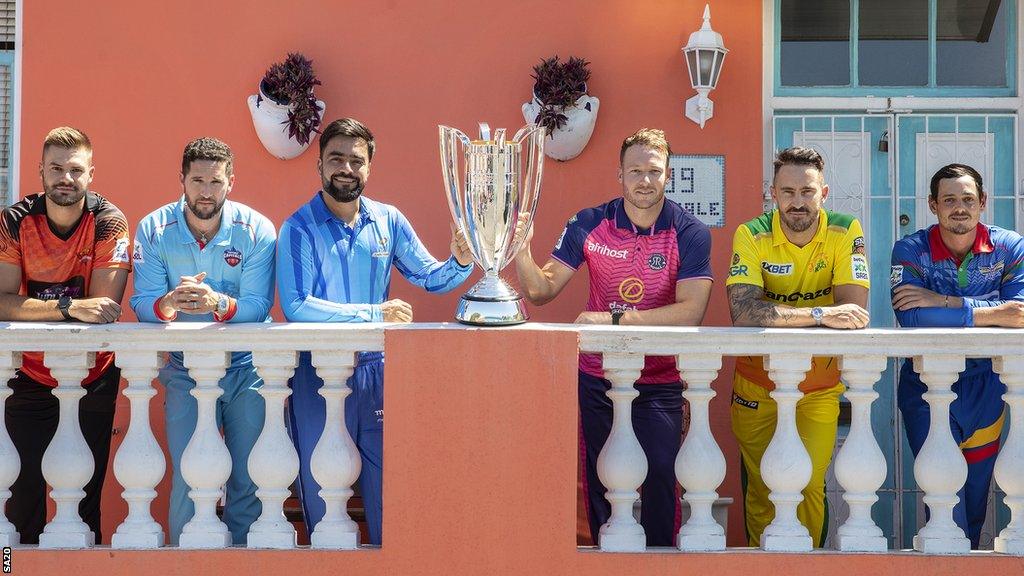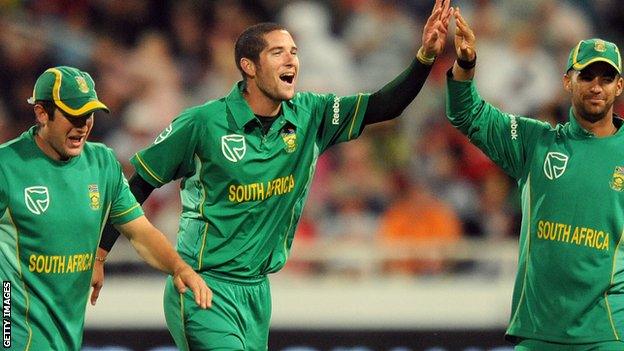Wayne Parnell on SA20, and making his return to the South Africa set-up
- Published

Wayne Parnell, second left, with the other SA20 franchise captains
South African cricket is entering a period of revolution.
The SA20 tournament, which begins on Tuesday, represents a new era after so much unrest among so many of the country's players in the last decade.
For years, Kolpak deals - which allowed sportspeople from countries with associate trade agreements with the European Union, such as South Africa, Zimbabwe and Caribbean nations to be afforded the same right to free movement as EU citizens - brought about a talent drain.
A host of the country's brightest talents headed to England for better opportunities and better contracts, trading away their eligibility to play for South Africa in the process.
That practice has now ended, following Britain's withdrawal from the EU - meaning players are free to return to play for their country of birth once again.
One of the highest profile exits was Wayne Parnell - the left-arm pace bowling all-rounder had played 111 games for the Proteas before he took off to England to sign a Kolpak deal.
For Parnell though, rather than coming to the decision quickly, it was more of a gradual thing.
"Going back to 2016 or 2017 there was a thought, but obviously I still felt like I could play international cricket. The turning point was in 2018, where I didn't commit to anything but that thought was there," Parnell says.
"I was in touch with Moeen Ali, he asked me if I wanted to come play for Worcestershire in the Blast, and obviously Moeen's someone that I really respect.
"When I got over to Worcestershire the whole Kolpak thing wasn't really a proper discussion, it was just playing Blast and a couple of County Championship games."
That Parnell's wife was pregnant, and he had already had a taste of county cricket via a couple of stints before his term at New Road, the decision that he came to in 2018 was one that made sense for both him and his family.
"When my wife was very close to giving birth [the decision came] just based on the fact that there would be a bit more stability in our lives," recalls Parnell. "With international cricket it's obviously very difficult with tours and all of that stuff."
"Obviously this career is very short and I was trying to lay down good foundations in terms of family life as well."

Wayne Parnell was once rated as one of South Africa's best players before leaving his country for better opportunities in England
The trade-off was that he wouldn't be able to play for his country any more. While it was a tough call, it was one Parnell was able to come to terms with.
"When I played what ended up being my last game, I didn't think 'this will be my last game, I might never play for South Africa'. But with that, when I made the decision to go Kolpak, I was also content and happy with that I might never play for South Africa again," he admits.
A return to the South African side was possible a couple of years down the line, with Kolpak deals coming to an end in 2020 as a result of Brexit.
That might have thrown things up in the air for some players, as it was unclear for a while what would happen regarding the deals.
"It was a massive grey area," Parnell says. "There were a lot of different scenarios that were thrown out prior to the ECB making a call on it. The whole Covid period obviously made things even worse, with a lot of uncertainty.
"When it was kind of up in the air I did think that I'd probably have to come back and play here [South Africa] or play in county cricket as an overseas pro."
He is candid when explaining his thought process during that period, stating he was never "closed off to anything".
That Parnell had been plying his trade with Western Province in South African domestic cricket pushed him back into the reckoning for a return to international cricket, and that eventually afforded him a place in the T20 World Cup squad in Australia.
"At the start of the South African season in 2021 we played a T20 knockout tournament, and I played some domestic red-ball games as well. Because I was playing back in the system and I did alright with our team I think they maybe saw that it was a conversation worth having," said Parnell.
"The end of 2021 I got the call from the selectors, firstly asking if I was still interested in playing international cricket. I think that's important, not to assume guys back in the South African set-up still want to be playing international cricket.
"Having that experience again was different and probably more special, because of thinking that I would never have it again."
The SA20 tournament represents another fantastic opportunity not only for Parnell, but for South African cricket as a whole.
He has the added pleasure, and pressure, of being able to captain Pretoria Capitals - another opportunity that, were Kolpak deals still a thing, might not have come.
Whether or not that would have been the case we will never know, but one thing is for certain, Parnell is relishing the opportunity to lead his side in the inaugural season of the tournament.
"I think we've been longing for a tournament of this magnitude and nature for such a long time. Having an opportunity to firstly play in this SA20 league is great and then obviously Pretoria Capitals showing faith in me to lead the franchise in the first season is a massive honour," he says.
Though Parnell's decision to go Kolpak was not motivated by money, some were, and that there is a substantial chasm between what is paid to South African domestic players, compared to those in England, is something that is difficult to ignore.
However, a tournament of this magnitude shows a trend in the right direction for South African cricket - the financial backing is significant and that is a massive benefit, which could grow the domestic game, and as a result, strengthen the Proteas' international teams.
"In the South African system, if you're not a top-tier player I think it's difficult to earn a decent living," Parnell explains.
"To have this competition, I think it's massive especially for local players, just to give them a taste of playing at a high level, playing in a very competitive tournament with quality overseas players in every single team - that'll firstly help the cricket.
"The financial side of it, the way I've seen it, that's always a bonus. I think everyone's excited to just see the competition in the first season and see how it goes."